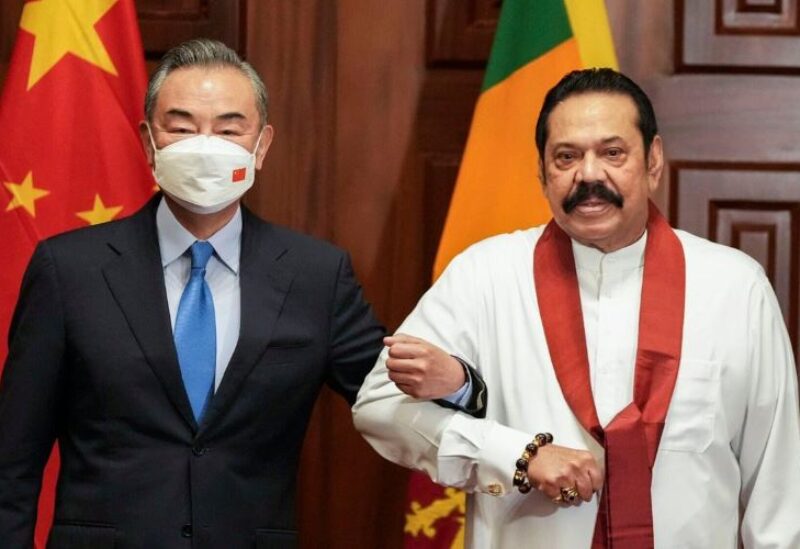
Sri Lankan Prime Minister Mahinda Rajapaksa, right, welcomes Chinese Foreign Minister Wang Yi
Sri Lanka’s president requested on Sunday that its loans be restructured and that it be granted preferential credit for imports of vital commodities, as the island nation grapples with its worst economic crisis in decades.
According to his office, President Gotabaya Rajapaksa informed visiting Chinese Foreign Minister Wang Yi that it would be “a big relief to the country” if attention could be devoted to restructuring debt repayments as a remedy to the economic crisis caused by the Covid-19 outbreak.
According to the office, Rajapaksa requested a concessionary credit arrangement for imports so that enterprises could continue to operate normally. He also asked for help in ensuring that Chinese visitors may go to Sri Lanka in a safe environment.
Wang and the president’s brother, Prime Minister Mahinda Rajapaksa, subsequently visited Colombo’s Port City, a reclaimed island created with Chinese investment, where they opened a promenade and launched the sailing of 65 boats to celebrate the two countries’ 65 years of diplomatic ties.
Wang said in his speech at the Port City that a protracted and unchecked epidemic has made economic recovery difficult, and that the two nations should use the anniversary of diplomatic ties to cooperate more closely together.
He didn’t go into detail, and he didn’t disclose any relief measures.
Wang landed in Sri Lanka on Saturday from the Maldives, concluding a multi-nation excursion that included stops in Eritrea, Kenya, and the Comoros in East Africa.
Wang and the president’s brother, Prime Minister Mahinda Rajapaksa, subsequently visited Colombo’s Port City, a reclaimed island created with Chinese investment, where they opened a promenade and launched the sailing of 65 boats to celebrate the two countries’ 65 years of diplomatic ties.
Wang said in his speech at the Port City that a protracted and unchecked epidemic has made economic recovery difficult, and that the two nations should use the anniversary of diplomatic ties to cooperate more closely together.
He didn’t go into detail, and he didn’t disclose any relief measures.
Wang landed in Sri Lanka on Saturday from the Maldives, concluding a multi-nation excursion that included stops in Eritrea, Kenya, and the Comoros in East Africa.
Sri Lanka is in the midst of one of its biggest economic crises, with foreign reserves of around $1.6 billion, hardly enough for a few weeks’ worth of imports. It also has international debt commitments in excess of $7 billion in 2022, including bond repayments of $500 million in January and $1 billion in July.
The decline in foreign reserves is being blamed in part on infrastructure projects that were developed with loans and do not deliver a satisfactory return on investment. China provided funding for the construction of a seaport and airport in the southern Hambantota area, as well as a comprehensive road network.
According to Central Bank estimates, current Chinese loans to Sri Lanka number roughly $3.38 billion, excluding loans to state-owned enterprises, which are accounted for separately and are estimated to be large.
“Technically, we may argue that we are now insolvent,” Muttukrishna Sarvananthan, principal researcher of the Point Pedro Institute of Development, stated. “If your net external foreign assets have been in the red, you are technically bankrupt.”
Households are facing acute shortages as a result of the circumstance. Long queues form to purchase necessities such as milk powder, cooking gas, and paraffin. Prices have risen dramatically, with the central bank reporting that the inflation rate had risen to 12.1 percent by the end of December, up from 9.9 percent in November. During the same time span, food inflation reached more than 22%.
Because of a cash scarcity, importers are unable to clear crucial cargo, and manufacturers are unable to purchase raw supplies from overseas.
Expatriate remittances have also decreased after the government mandated obligatory currency conversion and exchange rate regulations.
Ratings agency downgrades have resulted in a significant reduction in Sri Lanka’s borrowing ability. Fitch Ratings observed an elevated likelihood of loan failure in December.
The central bank has added a $1.5 billion currency exchange in Chinese yuan to the reserves, although experts dispute on whether it qualifies as foreign reserves.
Wang’s visit has once again underlined the regional power struggle between China and India, Sri Lanka’s nearest neighbor, which believes the island to be under its jurisdiction.
Before Wang met with Sri Lankan politicians, the country’s top Indian ambassador launched a rail service from a station near Colombo to the north on Sunday.
According to Vinod Jacob of the Indian embassy, “the focus placed by Indian Prime Minister Narendra Modi on connections with Sri Lanka in keeping with the ‘Neighborhood First’ strategy.”
He stated that India’s External Affairs Minister S Jaishankar’s recent comment that India will help Sri Lanka in tough times was a reinforcement of that policy in the current situation.
“We might see Sri Lanka being forced to choose between India and China for a future rescue package,” political expert Ranga Kalansooriya said.